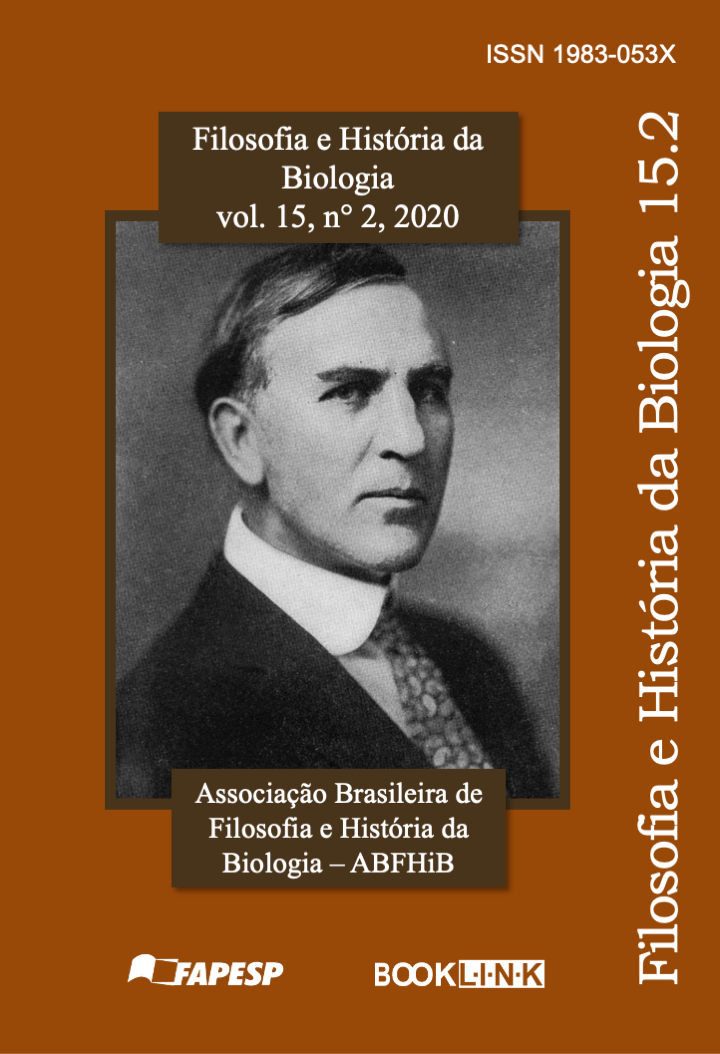The mechanical animic and the organic visible: the modern approach of the living being in mechanicism and natural history
DOI:
https://doi.org/10.11606/issn.2178-6224v15i2p137-157Keywords:
Mechanicism, Natural history, Organic domain, Modern age, BiologyAbstract
This paper aims at considering the Modern authors of mechanicism and natural history theories account of living beings trying to shed some light on the roots of biology as an autonomous science. First, it discusses the replacement of the mechanistic approach by animism focusing on René Descartes (1596-1650) and Robert Boyle (1627-1691) thinking. Second, it deals with natural history methodology of observing the visible. The research led to the conclusion that the 17th and 18th centuries mechanical and observational approaches of living beings contributed to the constitution of biology as a study field.
References
ALDROVANDI, Vlyssis. De quadrupedibus digitatis viviparis. Bologna: Nicolaum Tebaldinum, 1637.
AQUINO, Tomás de. Commentary on Aristotle’s De Anima. [1268]. Trad. Kenelm Foster; Silvester Humphries. South Bend: St Augustine’s Press, 1994.
ARISTÓTELES. De anima. [Sec. IV a. C.]. Trad. Maria Cecília Gomes dos Reis. São Paulo: Ed. 34, 2006.
ASHWORTH, William B. Emblematic natural history of the Renaissance. Pp. 17-81, in: JARDINE, Nicholas; SECORD, James A.; SPARY, Emma C. (eds.). Cultures of natural history. Cambridge: Cambridge University Press, 1996.
ATRAN, Scott. Origin of the species and genus concepts: an anthropological perspective. Journal of the History of Biology, 20 (2): 195-279, 1987.
BACON, Francis. The new organon. [1620]. JARDINE, Lisa; SILVERTHORNE, Michael (eds.). Cambridge: Cambridge University Press, 2000.
CAMARGO, David Ferreira. Desenvolvimento da ideia de sensibilidade em Diderot: o sonho de d'Alembert e o paradoxo sobre o comediante. São Carlos, 2016. Dissertação (mestrado em Filosofia) – Universidade federal de São Carlos.
BOYLE, Robert. A free enquiry into the vulgarly received notion of nature. DAVIS, Edward B.; HUNTER, Michael (eds.). Cambridge: Cambridge University Press, 1996.
DESCARTES, René. Discurso do método & Ensaios [1637]. Trad. César Augusto Battisti, Érico Andrade, Guilherme Rodrigues Neto, Marisa Carneiro de Oliveira Franco Donatelli, Pablo Rubén Ma-riconda, Paulo Tadeu da Silva. São Paulo: UNESP, 2018.
FOUCAULT, Michel. As palavras e as coisas. Trad. Salma Tannus Muchail. São Paulo: Martins Fontes, 2007.
FREZZATI JR. Haeckel e Nietzsche: aspectos da crítica ao mecanicismo no século XIX. Scientiae Studia, 1 (4): 435-461, 2003.
GEST, Howard. The discovery of microorganisms revisited. ASM News, 70 (6): 269-274, 2004.
GREENE, Marjorie Hatfield; DEPEW, David. The philosophy of biology: an episodic history. Cambridge: Cambridge University Press, 2004.
JACOB, Francois. A lógica da vida: uma história da hereditariedade. Trad. Ângela Lourenio de Souza. 2 ed. Rio de Janeiro: Graal, 2001.
MALEBRANCHE, Nicolas. The search after truth. Trad. Thomas M. Lennon; Paul J. Olscamp. Columbus: the Ohio State University Press. 1980.
MARTINS-DA-SILVA, Regina Célia Viana; FERNANDES, M. M.; MARGALHO. L. F. Noções morfológicos e taxonômicas para identificação botânica. Belém: Embrapa, 2014.
MAYR, Ernst. Biologia, ciência única: reflexões sobre a autonomia de uma disciplina científica. Trad. Marcelo Leite. São Paulo: Companhia das Letras, 2005.
PLATÃO, Sofista. [Séc. IV a. C.] Trad. Edson Bini. São Paulo: Edipro, 2014.
RAMOS, Maurício de Carvalho. O ser vivo. São Paulo: Martins Fon-tes, 2010.
RAMOS, Maurício de Carvalho. Uma abordagem filosófica dos problemas da biologia em seu contexto histórico: Mecanicismo e Vitalismo. Pp. 161-172, in: CARVALHO, Marcelo; CORNELLI, Gabriele. Filosofia: conhecimento e linguagem. Cuiabá: Central de texto, 2013.
RICHARDS, Robert J. Kant and Blumenbach on the Bildungstrieb: a historical misunderstanding. Studies in History and Philosophy of Biological and Biomedical Sciences, 31 (1): 11–32, 2000.
SANTOS, Leonel Ribeiro. A formação do pensamento biológico de Kant. Pp. 17-81, in: MARQUES, Ubirajara Rancan de Azevedo (org.). Kant e a biologia. São Paulo: Barcarolla, 2012.
SHELDRAKE, Rupert. Uma nova ciência da vida: a hipótese da causação formativa e os problemas não resolvidos da biologia. Trad. Marcelo Borges. São Paulo: Cultriz, 2013.
WAISSE, Silvia; AMARAL, Maria Thereza Cera Galvão do; ALFONSO-GOLDFARB, Ana M. Raízes do Vitalismo francês: Bordeu e Barthez, entre Paris e Montpellier. História, Ciências, Saúde, 18 (3): 625-640, 2011.
WALAEUS, Johannes. Epistola prima de motu chyli et sanguinis. Pp. 531-565, in: BARTHOLIN, Thomas. Anatomia reformata. The Hague: Adrianus Vlacq, 1655.
ZAMMITO, John H. The gestation of German biology: philosophy and physiology from Stahl to Schelling. Chicago and London: The University of Chicago Press, 2018.
Downloads
Published
Issue
Section
License
Copyright (c) 2020 Filosofia e História da Biologia

This work is licensed under a Creative Commons Attribution-NonCommercial-ShareAlike 4.0 International License.
The published manuscripts become the property of the journal Philosophy and History of Biology, and the authors accept the terms of this license and agree to assign the copyright for publication, in addition to agreeing with the publication's commitment to offering open access to all of its content. The information and concepts issued in signed papers are the sole responsibility of their authors.


 cademia.edu
cademia.edu
